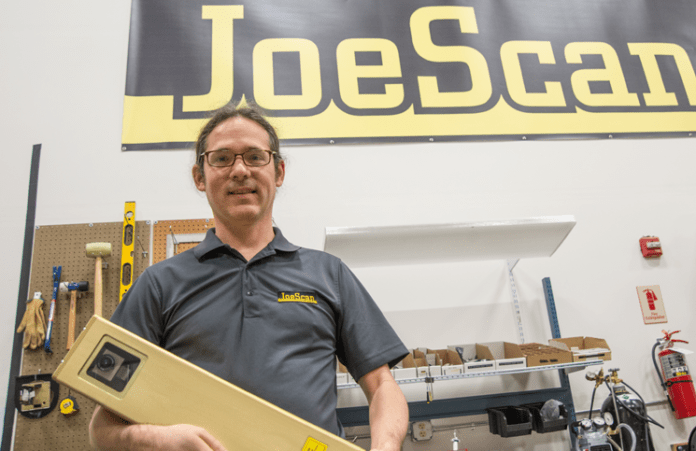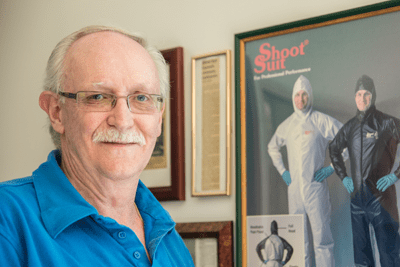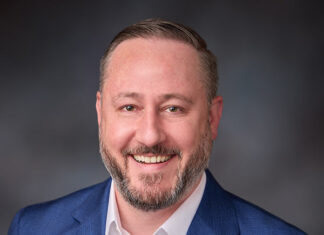Coveralls, 3-D laser scanners, pressure washers and vitamins. It’s hard to believe all four of these very different things are made in Southwest Washington.
Check out these four companies to learn about local products that may have been hidden under your nose.
JoeScan Inc.
Soon after Joey Nelson graduated with an electrical engineering degree from Washington State University, he turned an idea into a thriving business.
“I combined the sawmill automation technology that my dad had developed at his company (Nelson Brothers Engineering) with the laser work I had done [in college], and advanced it along,” said Nelson, president of JoeScan Inc. in Vancouver.
Nelson developed a better and faster way for sawmills to cut logs into two-by-fours. As each log moves down a conveyor, a laser projects a straight line onto the wood. Next, a camera views the line of light, gathers data on the shape of the log and determines how to best cut it.
Nelson started JoeScan Inc. in 1999 in Pullman, and moved the company to a larger space in Vancouver three years later. The company, which now employees 10 people, designs and manufactures 3-D laser scanners for sawmills, as well as for the railway, tire inspection and food processing (think slicing meat) industries.
“Right now, we’re seeing a huge spike in demand. In the United States, it’s been ongoing, but we’re starting to see international pick-up,” said Nelson.
As smaller sawmills – like Columbia Vista Corp. in Vancouver – grow, they turn to JoeScan for solutions to speed up processes and reduce manual labor.
3-D scanners increase the output and accuracy of cutting logs. On a manual line, people can cut about 20 pieces per minute, compared with to up to 100 pieces per minute using a 3-D scanner.
“It’s pretty impressive how much more competitive the mills are once they start using our technology.”
In the auto body industry, dirty clothes can ruin a paint job.
That’s why Battle Ground-based Shoot Suit has been making reusable coveralls for painters in the auto body industry for more than 30 years. The suits’ protective coating repels lint and other particles that may otherwise stick to fresh car paint.
“Most of the paint rooms are cleaner than your average operating rooms, so painters can’t wear clothes that get build-up on them,” said Larry Kopkie, who owns Shoot Suit. Kopkie also owns sister companies Detro Manufacturing and R & H Products.
Competitors make most of their products overseas, but Shoot Suit doesn’t. 12 employees produce the majority of Shoot Suits’ suits in Battle Ground – about 400 to 500 per week. The suits cost about $60 and last three to four months, an alternative to cheaper disposable ones.
The company relies on how well the used car market and collision repair industries perform. Shoot Suit took a big hit during the recession and the automotive buy back program.
“People were buying new cars, and there was no need for [used] cars to be fixed,” he said. “But that has washed through the system – another reason why out business is up.”
Increased demand for professional car restoration has also contributed to Shoot Suit’s improved sales, Kopkie said.
“All the baby boomers are going back to their childhood and taking old cars to professional shops.”
That Vitamin D capsule (to treat the rainy day blues) you swallowed this morning might be made right here in Vancouver.
Pacific Nutritional custom manufactures dietary supplements – part of a rapidly growing industry.
“The vitamin industry might be growing as much as 40 percent,” said Scott Haugen, who serves as the company’s chief operating officer. “As Baby Boomers age out, they’re seeking ways to improve their health. They don’t want to take drugs. They want to take something more natural.”
Pacific Nutritional produces about 50,000 bottles worth of vitamins every day for about 100 different brands sold at retailers, health food stores and doctors’ offices in the U.S. and in other countries.
“[Our] vitamins are very popular all over the world because of the trust and confidence people have in this his type of product being made in the U.S.,” said Haugen.
Because of its third party certifications (USDA Organic certified, Kosher certified, Halal certified, etc.), Pacific Nutritional falls in the top 10 percent of all dietary supplement manufacturers, said Haugen.
To make vitamins, a worker blends together ingredients – mushroom powder and Vitamin C, for example – into a giant blender. Next, the powder is compressed into tablets, coated with color, bottled, shrink-wrapped, labeled and finally shipped.
Pacific Nutritional moved from Oregon to Vancouver seven years ago and now has about 125 employees, including homeopathic doctors, botanists and lab chemists. Over the next decade, the company hopes to double its employee size and expand its building into an adjacent space.
If you’ve ever driven a rental car, you probably didn’t treat it like you owned it. People are rough with things they don’t actually own. The same goes with rental equipment used to clean boats, sidewalks, RVs and decks.
Shark pressure washers are made for homeowners, commercial and industrial contractors looking to use the equipment a few times or heavily throughout the year. The machines can be rented at rental & hardware stores throughout the nation.
“You can just go in a rental or hardware store, rent the machine, take it back and you don’t have to store it or deal with winterizing it,” said Eric Loucks, director of sales for Karcher North America Rental Division in Camas. Karcher, a family-owned enterprise and leading provider of cleaning technology, has owned the Shark brand since 2004.
Shark pressure washers are known for their durability. So much so, someone can drop the pressure washer from a truck, start it up, use it and do it over and over again – without damage.
“Our products are designed for years of use,” said Loucks. “About 12 years ago, we used Shark pressure washers to help clean equipment in an oil spill in Cape Cod, and some of those machines are still in operation today.”
Karcher makes Shark cold water (removes dry debris) and hot water (removes wet residue like oil) pressure washers in Camas and Monterrey, Mexico.
The company doesn’t just assemble parts in the manufacturing process. They makes their own pumps in Italy, as well as labels. They also paint their own equipment, and bend and weld steel to make their own frames and chassis.
Shark recently introduced a new towable hot pressure washer called the Tiger Shark at the 2016 American Rental Association (ARA) Rental Show.
“The Tiger Shark is light and rugged, and when detached from a vehicle, it’s easily moved around a job site,” Loucks said. “There’s nothing like it in the rental market today.”







